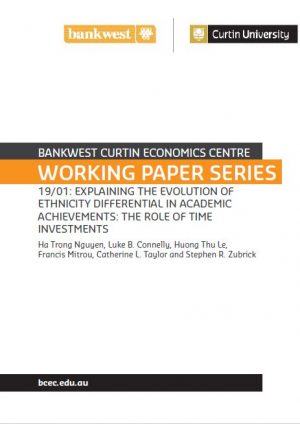Explaining the evolution of ethnicity differentials in academic achievements: The role of time investments
Children of Asian immigrants in most English-speaking destinations have better academic outcomes, yet the underlying causes of their advantages are under-studied. We employ panel time-use diaries by two cohorts of children observed over a decade to present new evidence that children of Asian immigrants begin spending more time than their peers on educational activities from school entry; and, that the ethnicity gap in the time allocated to educational activities increases over time. By specifying an augmented value-added model and invoking a quantile decomposition method, we find that the academic advantage of children of Asian immigrants is attributable mainly to their allocating more time to educational activities or their favorable initial cognitive abilities and not to socio-demographics or parenting styles. Furthermore, our results show substantial heterogeneity in the contributions of initial cognitive abilities and time allocations by test subjects, test ages and points of the test score distribution.




